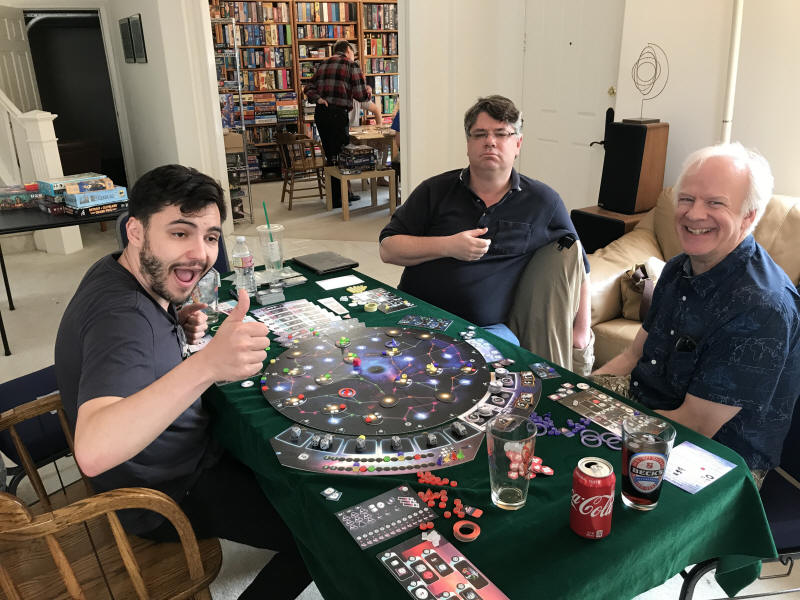| |
|
Had a great time at Jeff Goldsmith’s Memorial Day party, pretty much
gaming from noon to close to midnight Saturday, Sunday and Monday (and a few games
Friday evening). It was great to see the gaming crowd, old and
new. Alex Simmons, Noah and I were staying in the Pasadena house
and driving up to Jeff’s house each day. Tom Lehman was there, and
as a result a lot of his games (along with currently unpublished
expansion packs) were in play.
Jeff did his usual job of playing the consummate host, cooking
breakfast lunch and dinner for the thirty or forty people that were
there each day.

We had a birthday cake for Noah, since his birthday coincided with
the party.

And of course, there was a lot of very fine Scotch, of which my
contribution ended up being on the low end.

Here are my
notes on the stuff we played that were new to me (skipping things like
roll for the galaxy and ethnos):
|
| |
New Frontiers (Tom Lehman game): This is a rift on the “race
for the galaxy” game theme. It’s more of a “roll for the galaxy”
derivative, but called a board game because the cards have been changed
to cardboard disks that plug into a main player board. But if
you’ve played “roll for the galaxy,” this game will feel very familiar.
The main innovations were (a) shifting role selection to a “Puerto Rico”
style mechanism where a player picks a role, gets some benefit, and
everyone participates, (b) you buy developments from a common store, and
(c) system selection is done in a seven-wonders style pick a system and
pass the rest to the next player for selection. All of those
worked well and it felt a lot more interactive than RFTG. We
played once with an as yet unpublished expansion that was fine but
didn’t seem to add much to the game. The only downside is
the same one in RFTG; sometimes people get very strong combinations that
let them run away with the game. I did purchase the game.
|
|
Res Arcana (Tom Lehman game): This was the game everyone was
playing constantly over the weekend. It’s well designed if not
particularly innovative, a kind of magic-the-gathering deck building
game with tap-able cards that ramp up your capacities during play.
It has enough variability that players tend to adopt different
strategies, which gives it an interesting asymmetrical feel and provides
a few alternate paths to help you on the way to victory. The main
issue with the game is that the main driver for everyone is a two-phase
engine build; phase I is building a resource engine, phase II is
building a conversion engine to change those resources into victory
points. The problem is that there are only a few ways to build the
conversation engine and if one player takes the one you need, you may
have (quite literally) nothing to do for the later part of the game
since you have resources that have become useless. This happened
in both games I played (once to me, once to someone else) and I heard it
happened to others as well. Tom had an expansion pack
(unpublished) that he thinks helps with that, and some people said that
an optional drafting rule helped, but we didn’t use either in the games
we played so I can’t really comment on it.
|
|
|
Pulsar 2849: I liked this game but I
wouldn’t call it a “Euro.” Much too complicated. It had one
pretty awesome mechanism that I thought was the most interesting
decision you made each turn; you roll dice and based on distribution you
get a “center of mass” marker. Picking lower dice gives you plus
positions and high dice minus positions on an initiative track and on an
engineering track, the last one giving you the equivalent of money to
buy certain things (they were “engineering cubes” but who’s counting).
It’s a visually beautiful game as well, with a cool high-tech looking
round board with tech trees and other things radiating off of it.
The problem is that there were six or seven different paths to collect
victory points, each of which worked differently than the others, and it
wasn’t like concentrating on one won the day (I did run away with the
game but that was more getting two things that enhanced each other and
having no one challenge me for them). So each turn you have a
dozen different things you can do, which is fine if you’ve played a few
times, know the tradeoffs, and have a fair amount of time to think about
it. But for casual gaming (by which I mean “drinking”) it’s a
little intense.
|
 |
Decrypto: I don’t know how long this had been out, but it was
a fun word game a la code words but which had a interesting twist.
You split into two teams. Words are arranged in a random order
(that doesn’t change). Players get to see their own team’s words.
One member of the team gets a card that specifies a specific order, like
“4, then 1, then 3” and the member tries to give clues to his players so
they can guess that sequence by hinting at the word in position 4, 1 and
3 respectively. Pretty simple, right, because you know the words…
so one word we had was “button” and I used “down” and it was pretty
obvious to people that was a hint for button. But here is the
twist; you give your clues to the other team, and so they start to build
up a set of words that are related, and they try to determine the order
as well. If they guess right twice, they win. If your team
misses the sequence twice, they lose. So you have to give clues
that don’t seem related at all. In the game I was referring too,
someone else used the clue “dress shirt” and as soon as the other team
saw those two together, they figured out the word must be “button” and
were always able to guess that part of the sequence.
|
|
Century Eastern Wonders: I’ve heard this is one of many games that all
have the same general theme and mechanics, and that some versions are
better than this, but this is the one I played. I liked it.
It’s a combination of engine building and area control (sort of a
two-level area control, you get spots on the board, which is a set of
interlocking tiles, and the block you use to get the spot comes off a
grid; empty spots on the grid give you VP, and empty rows on the grid
give you a bonus, like an extra movement or straight VP). The
rules are simple and it becomes a maximization problem to get the right
resources to buy victory points... but once you've bought them, a new VP
chit comes out in a different location with a new set of resources.
I bought this game.

|
Battlestar Galactica:
This is a co-op game based on the new TV series. It’s a
standard “we work together to beat the game, but one person is a
cyclon/spy/traitor/monster.” It was as well balanced as those
type of things tend to be, and did a good job of feeling like the
show. I had fun with it, but you have to play with the right
crowd and not take it too seriously. Funny thing with this is
that you have a chance to become the Admiral of the fleet, the
President of the civilian population, and in the middle of the game
a chance to find out you are a cyclon (become a traitor). And
I became all three at the same time, which made it pretty easy to
make sure the Galactica died a horrible, messy death in space (mass
starvation as it turned out).


Krass Kariert: This was a trick
taking card game, but the tricks weren’t for points, they were to
get things out of your hand. You can play a single, a
straight, or x of a kind, with the obvious ranking (a triple
straight beat two of a kind, two of a kind beats a two card
straight, two card straight beats any single, and within a category
high cards beat low cards). There are a few special cards
thrown in as well, like a “stop” which means you end the round
prematurely and you get to play next. One interesting
mechanism is that you can’t rearrange your cards, so you’re looking
for sequences of play to give you the best options… like play a stop
so you can play a low single that sits between two cards of the same
value… now you have two of kind to play. |






